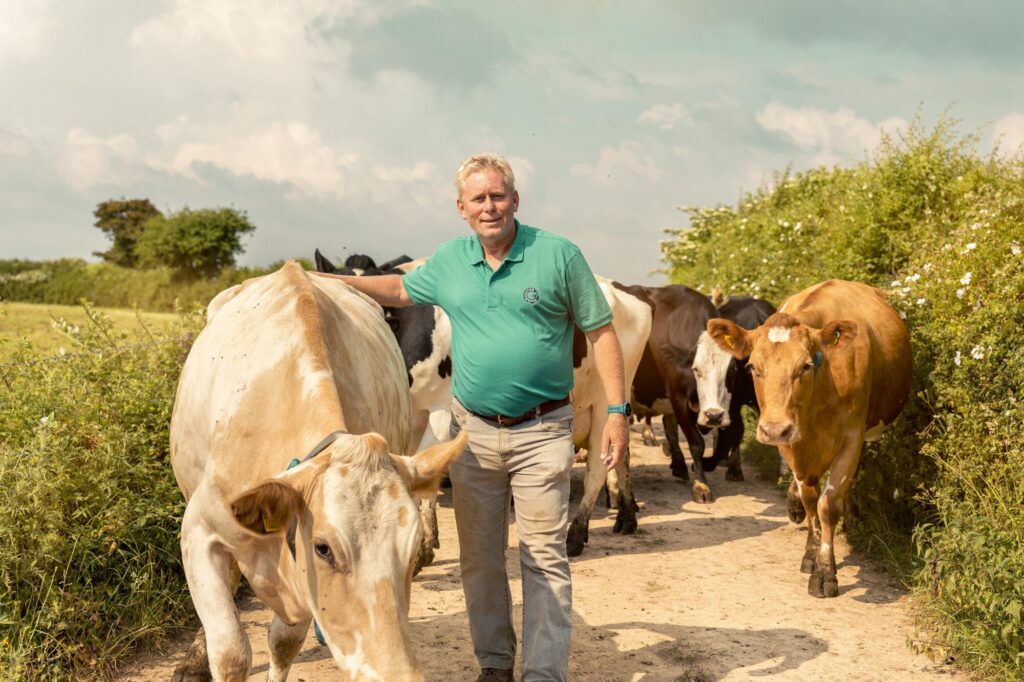Two key benefits of introducing roasted pulses to dairy cows’ diet
19th August 2023
In line with Somerset-based Godminster Farm’s ethos: ‘nature repays those who treat her kindly’, Pete Cheek who has been in charge of the farm’s 300 organic dairy herd for more than 25 years, is working with McArthur Agriculture to replace imported soya bean meal from the cows’ diet with home-grown and roasted pulses.
Reducing agricultural emissions
Feeding trials at Godminster Farm provide the foundation for further work to be completed as part of the recently announced Defra funded Nitrogen Efficient Plants for Climate Smart Arable Cropping Systems (NCS) project, of which McArthur Agriculture is a key partner. The project has been launched to help farmers reduce agricultural emissions by 1.5Mt CO2e a year.
“Climate change is a huge issue and by practising organic farming methods, we are already farming ‘in-tune’ with the environment,” explained Cheek. “However, another important factor for us is to be able to fully validate the provenance of the components of our cows’ rations to consumers.
“Godminster Farm’s overall aim is to reduce the carbon footprint of our cows’ diet and deliver full traceability of all their rations by growing beans here on the farm.”
McArthur Agriculture and Pete Cheek have been working together since June 2022 as Godminster’s aim fits perfectly within the NCS project.
What is the NCS project?
The NCS, a four-year £5.9M ambitious research programme which will involve 200 farms and 17 industry partners, is funded by Defra’s Farming Innovation Programme and delivered by Innovate UK.
The bold, twin objectives of the project led by the Processors and Growers Research Organisation (PGRO), are to increase pulse cropping in arable rotations to 20% across the UK (currently 5%) and to enable livestock farmers to substitute up to 50% of imported soya meal used in livestock feed with more climate-friendly home-grown pulses and legumes.
“Godminster Farm is already engaging with the guiding principles of the NCS project by adding beans to its crop rotations for inclusion in its cows’ rations, working towards the replacement of imported soya bean meal in organic dairy,” added John McArthur, MD of McArthur Agriculture.
Increase milk yield
Cheek met McArthur for the first time at Groundswell in June 2022 and they committed to visit Denmark together to see first-hand how Danish farms are already substituting imported soybean meal with roasted beans and cereals. Work there has shown the roasting process improved the quality of the protein in beans, allowing the formulation of diets without soya bean meal while maintaining milk yield and quality.
“I was staggered as to the results achieved by the Danish farmers. They were achieving double the milk yield we get at Godminster by including roasted beans in their cow’s diets and without using soya,” added Cheek.
“One famer was conducting circular rations – he grew the beans, lupins, maize and cereal and fed them and sold the milk produced. Everything he wanted to feed his cows; he grew. Danish organic dairy farmers seem to have it sussed.”
On returning to the UK, Godminster Farm started trialling post-harvest processing of beans, supplied by Organic Arable, in late 2022.
“We roasted the beans with a Mecmar T05 roaster from McArthur Agriculture, they were then milled and incorporated into the cows’ diet as part of the parlour feed and in the total mixed ration (TMR),” explained Cheek.
The trial was successful and Cheek is now planning to permanently include roasted beans in the ration and is considering the addition of roasted lupins, to add more protein
“The next phase of our trial will be to roast the beans we are growing on-farm this year straight from the combine, rather than roasting beans we have bought-in, this will allow us to store them safely and increase the amount we are able to add to the rations,” added Cheek.
“We are looking forward to working with the team at Godminster this harvest. Learning from the Danish farmers we will process the beans at a higher moisture content than before. This should improve gelatinisation and further improve protein quality, said McArthur “Moving to 100% home grown protein is a big move for any farm business, it is a decision the NCS Project is aiming to de-risk for farmers like Pete in the future,” concluded McArthur.

